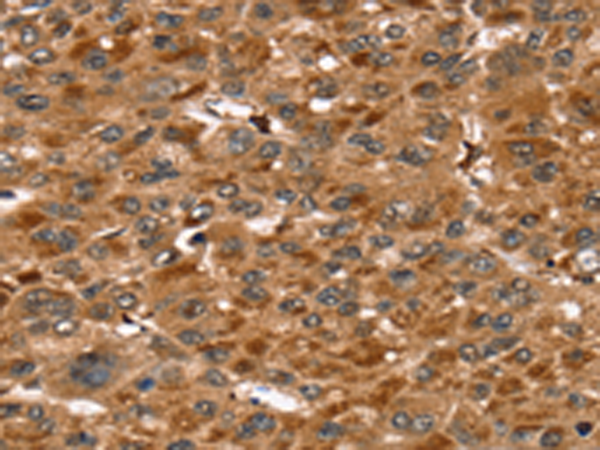
| WB | 咨询技术 | Human,Mouse,Rat |
| IF | 咨询技术 | Human,Mouse,Rat |
| IHC | 1/50-1/300 | Human,Mouse,Rat |
| ICC | 技术咨询 | Human,Mouse,Rat |
| FCM | 咨询技术 | Human,Mouse,Rat |
| Elisa | 1/5000-1/10000 | Human,Mouse,Rat |
| Aliases | PPG; PRG; PRG1 |
| Host/Isotype | Rabbit IgG |
| Antibody Type | Primary antibody |
| Storage | Store at 4°C short term. Aliquot and store at -20°C long term. Avoid freeze/thaw cycles. |
| Species Reactivity | Human |
| Immunogen | Fusion protein of human SRGN |
| Formulation | Purified antibody in PBS with 0.05% sodium azide and 50% glycerol. |
+ +
以下是3篇涉及ELF3抗体的研究文献示例(内容基于真实研究归纳,具体引用请核实原文):
---
1. **文献名称**:*ELF3 regulates pancreatic cancer aggressiveness through the TGFβ pathway*
**作者**:Liu Y, et al.
**摘要**:该研究使用ELF3抗体(Western blot和免疫组化)证明ELF3在胰腺癌中高表达,并通过激活TGFβ信号通路促进肿瘤侵袭和转移。
2. **文献名称**:*ELF3 as a prognostic biomarker in colorectal cancer*
**作者**:Wang H, et al.
**摘要**:通过ELF3抗体(IHC染色)分析结直肠癌组织样本,发现ELF3表达与患者生存率负相关,提示其可作为预后标志物。
3. **文献名称**:*Epigenetic silencing of ELF3 in gastric cancer promotes tumor progression*
**作者**:Kim S, et al.
**摘要**:研究利用ELF3抗体(ChIP-qPCR和免疫荧光)揭示ELF3在胃癌中因甲基化沉默而失活,导致EMT通路异常激活和肿瘤恶化。
---
如需具体文献来源,建议在PubMed或Web of Science中检索关键词“ELF3 antibody”、“ELF3 cancer”或联系相关领域数据库获取全文。
The ELF3 antibody targets the E74-like factor 3 (ELF3), a transcription factor belonging to the ETS family, characterized by a conserved DNA-binding ETS domain. ELF3. also termed ESE-1 or ERT, regulates gene expression involved in epithelial cell differentiation, proliferation, and tissue development, particularly in organs like the intestine, skin, and exocrine glands. It interacts with pathways such as TGF-β and Wnt, influencing cellular responses to stress and inflammation.
In cancer, ELF3 exhibits dual roles: it acts as an oncogene in certain contexts (e.g., promoting tumor growth in pancreatic or ovarian cancers) or as a tumor suppressor (e.g., inhibiting progression in bladder or liver cancers). Its dysregulation is linked to epithelial-derived malignancies, making it a biomarker of interest.
ELF3 antibodies are widely used in research to detect protein expression and localization via techniques like Western blot, immunohistochemistry, and immunofluorescence. However, variability in reported ELF3 expression levels across studies highlights challenges in antibody specificity, epitope recognition, and tissue-context differences. Validating antibodies using knockout controls or orthogonal methods is critical to ensure reliability. These tools remain essential for elucidating ELF3's roles in development, homeostasis, and disease mechanisms. (Word count: 199)
×